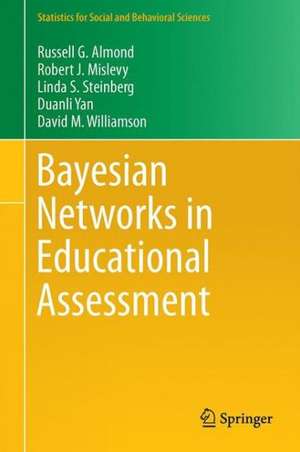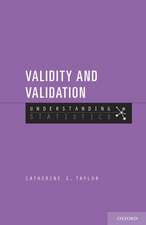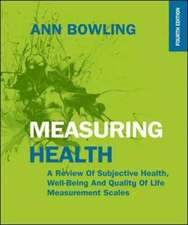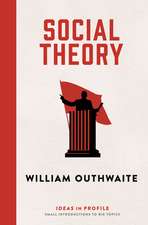Bayesian Networks in Educational Assessment: Statistics for Social and Behavioral Sciences
Autor Russell G. Almond, Robert J. Mislevy, Linda S. Steinberg, Duanli Yan, David M. Williamsonen Limba Engleză Hardback – 11 mar 2015
Part I develops Bayes nets’ foundations in assessment, statistics, and graph theory, and works through the real-time updating algorithm. Part II addresses parametric forms for use with assessment, model-checking techniques, and estimation with the EM algorithm and Markov chain Monte Carlo (MCMC). A unique feature is the volume’s grounding in Evidence-Centered Design (ECD) framework for assessment design. This “design forward” approach enables designers to take full advantage of Bayes nets’ modularity and ability to model complex evidentiary relationships that arise from performance in interactive, technology-rich assessments such as simulations. Part III describes ECD,situates Bayes nets as an integral component of a principled design process, and illustrates the ideas with an in-depth look at the BioMass project: An interactive, standards-based, web-delivered demonstration assessment of science inquiry in genetics.
This book is both a resource for professionals interested in assessment and advanced students. Its clear exposition, worked-through numerical examples, and demonstrations from real and didactic applications provide invaluable illustrations of how to use Bayes nets in educational assessment. Exercises follow each chapter, and the online companion site provides a glossary, data sets and problem setups, and links to computational resources.
| Toate formatele și edițiile | Preț | Express |
|---|---|---|
| Paperback (1) | 603.58 lei 6-8 săpt. | |
| Springer – 5 oct 2016 | 603.58 lei 6-8 săpt. | |
| Hardback (1) | 806.87 lei 6-8 săpt. | |
| Springer – 11 mar 2015 | 806.87 lei 6-8 săpt. |
Din seria Statistics for Social and Behavioral Sciences
-
 Preț: 361.83 lei
Preț: 361.83 lei - 18%
 Preț: 889.75 lei
Preț: 889.75 lei - 20%
 Preț: 696.30 lei
Preț: 696.30 lei - 15%
 Preț: 586.38 lei
Preț: 586.38 lei -
 Preț: 393.13 lei
Preț: 393.13 lei - 15%
 Preț: 648.24 lei
Preț: 648.24 lei - 18%
 Preț: 896.70 lei
Preț: 896.70 lei - 18%
 Preț: 904.11 lei
Preț: 904.11 lei - 18%
 Preț: 811.61 lei
Preț: 811.61 lei - 18%
 Preț: 782.10 lei
Preț: 782.10 lei - 15%
 Preț: 649.54 lei
Preț: 649.54 lei - 23%
 Preț: 788.31 lei
Preț: 788.31 lei -
 Preț: 390.46 lei
Preț: 390.46 lei - 15%
 Preț: 650.04 lei
Preț: 650.04 lei - 18%
 Preț: 952.26 lei
Preț: 952.26 lei - 18%
 Preț: 1126.52 lei
Preț: 1126.52 lei - 18%
 Preț: 1005.11 lei
Preț: 1005.11 lei - 18%
 Preț: 1219.94 lei
Preț: 1219.94 lei - 18%
 Preț: 897.65 lei
Preț: 897.65 lei - 15%
 Preț: 588.37 lei
Preț: 588.37 lei - 15%
 Preț: 644.30 lei
Preț: 644.30 lei - 18%
 Preț: 730.97 lei
Preț: 730.97 lei -
 Preț: 381.21 lei
Preț: 381.21 lei - 15%
 Preț: 638.43 lei
Preț: 638.43 lei - 18%
 Preț: 1228.47 lei
Preț: 1228.47 lei -
 Preț: 386.81 lei
Preț: 386.81 lei - 15%
 Preț: 639.73 lei
Preț: 639.73 lei -
 Preț: 381.00 lei
Preț: 381.00 lei - 18%
 Preț: 1223.74 lei
Preț: 1223.74 lei -
 Preț: 385.25 lei
Preț: 385.25 lei - 15%
 Preț: 702.87 lei
Preț: 702.87 lei -
 Preț: 383.33 lei
Preț: 383.33 lei - 18%
 Preț: 1228.47 lei
Preț: 1228.47 lei -
 Preț: 390.25 lei
Preț: 390.25 lei
Preț: 806.87 lei
Preț vechi: 984.00 lei
-18% Nou
Puncte Express: 1210
Preț estimativ în valută:
154.42€ • 159.99$ • 128.87£
154.42€ • 159.99$ • 128.87£
Carte tipărită la comandă
Livrare economică 21 martie-04 aprilie
Preluare comenzi: 021 569.72.76
Specificații
ISBN-13: 9781493921249
ISBN-10: 149392124X
Pagini: 666
Ilustrații: XXXIII, 662 p. 155 illus., 87 illus. in color.
Dimensiuni: 155 x 235 x 43 mm
Greutate: 1.16 kg
Ediția:2015
Editura: Springer
Colecția Springer
Seria Statistics for Social and Behavioral Sciences
Locul publicării:New York, NY, United States
ISBN-10: 149392124X
Pagini: 666
Ilustrații: XXXIII, 662 p. 155 illus., 87 illus. in color.
Dimensiuni: 155 x 235 x 43 mm
Greutate: 1.16 kg
Ediția:2015
Editura: Springer
Colecția Springer
Seria Statistics for Social and Behavioral Sciences
Locul publicării:New York, NY, United States
Public țintă
ResearchCuprins
Introduction.- An Introduction to Evidence-Centered Design.- Bayesian Probability and Statistics: a review.- Basic graph theory and graphical models.- Efficient calculations.- Some Example Networks.- Explanation and Test Construction.- Parameters for Bayesian Network Models.- Learning in Models with Fixed Structure.- Critiquing and Learning Model Structure.- An Illustrative Example.- The Conceptual Assessment Framework.- The Evidence Accumulation Process.- The Biomass Measurement Model.- The Future of Bayesian Networks in Educational Assessment.- Bayesian Network Resources.- References.
Recenzii
“The three parts of the book give an excellent overview of current developments and the status of a still developing and emerging field. In this way, it helps researchers in psychometrics and educational assessment to familiarize themselves with Bayesian networks, and their applications. ... The targeted audience of the book seems to focus on students at the graduate level. In this way, it is written for a large audience, and it suits the needs of many researchers.” (Nikky van Buuren, Sebastiaan de Klerk and Bernard P. Veldkamp, Psychometrika, Vol. 82, 2017)
“This book will provide valuable information on using data-mining along with graphical models in educational assessment. It is one of the initial works that well explain the operative procedures of designing, validating, and implementing the data-driven, competency-oriented diagnostic assessment. The book should be a good reference for both scholars and practitioners in the areas of educational assessment, learning environments and curriculum design, and school improvement.” (Fengfeng Ke, Technology, Knowledge and Learning, Vol. 24, 2019)
Textul de pe ultima copertă
Bayesian inference networks, a synthesis of statistics and expert systems, have advanced reasoning under uncertainty in medicine, business, and social sciences. This innovative volume is the first comprehensive treatment exploring how they can be applied to design and analyze innovative educational assessments.
Part I develops Bayes nets’ foundations in assessment, statistics, and graph theory, and works through the real-time updating algorithm. Part II addresses parametric forms for use with assessment, model-checking techniques, and estimation with the EM algorithm and Markov chain Monte Carlo (MCMC). A unique feature is the volume’s grounding in Evidence-Centered Design (ECD) framework for assessment design. This “design forward” approach enables designers to take full advantage of Bayes nets’ modularity and ability to model complex evidentiary relationships that arise from performance in interactive, technology-rich assessments such as simulations. Part III describes ECD,situates Bayes nets as an integral component of a principled design process, and illustrates the ideas with an in-depth look at the BioMass project: An interactive, standards-based, web-delivered demonstration assessment of science inquiry in genetics.
This book is both a resource for professionals interested in assessment and advanced students. Its clear exposition, worked-through numerical examples, and demonstrations from real and didactic applications provide invaluable illustrations of how to use Bayes nets in educational assessment. Exercises follow each chapter, and the online companion site provides a glossary, data sets and problem setups, and links to computational resources.
Part I develops Bayes nets’ foundations in assessment, statistics, and graph theory, and works through the real-time updating algorithm. Part II addresses parametric forms for use with assessment, model-checking techniques, and estimation with the EM algorithm and Markov chain Monte Carlo (MCMC). A unique feature is the volume’s grounding in Evidence-Centered Design (ECD) framework for assessment design. This “design forward” approach enables designers to take full advantage of Bayes nets’ modularity and ability to model complex evidentiary relationships that arise from performance in interactive, technology-rich assessments such as simulations. Part III describes ECD,situates Bayes nets as an integral component of a principled design process, and illustrates the ideas with an in-depth look at the BioMass project: An interactive, standards-based, web-delivered demonstration assessment of science inquiry in genetics.
This book is both a resource for professionals interested in assessment and advanced students. Its clear exposition, worked-through numerical examples, and demonstrations from real and didactic applications provide invaluable illustrations of how to use Bayes nets in educational assessment. Exercises follow each chapter, and the online companion site provides a glossary, data sets and problem setups, and links to computational resources.
Caracteristici
Features exercises to make the material concrete ECD portions of the book (Ch. 2, 12 & 13) build on work that was basis for the 2000 NCME award for Outstanding Technical Contribution to Educational Measurement received by the authors Includes basic review of Bayesian probability and statistics and an introduction to Evidence-Centered Design Includes supplementary material: sn.pub/extras














